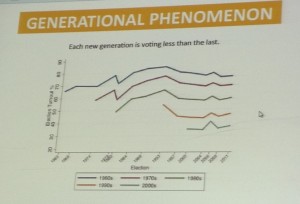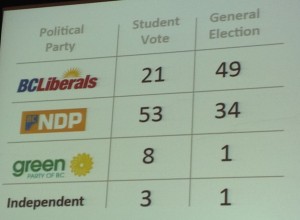“An engaged teacher engages their students,” said Taylor Gunn of CIVIX Canada (@CIVIX_Cananda) to over a hundred BC educators from all grades and all over the province as he opened Democracy Bootcamp on February 26. As I looked around the Wosk Centre for Dialogue, I was interested and curious about what was going to happen, but I don’t know that I can say I was truly engaged at that point. I wanted to learn more, I wanted to become a better teacher of civics – but although I hate to say it, walking into the room, I was more excited by the circular set up and the microphones than by the content that I expected from the schedule that I had been given.
I could go over everything we discussed – and trust me, when we got into things, I took the notes to do it! – but instead, I want to focus more on my reaction.
I’ve never considered myself particularly political. I ran our school’s Student Vote (@StudentVote) campaign during the last provincial election because even though I don’t consider myself particularly political, I believe very strongly in the responsibility of citizens to vote. We are incredibly lucky to live in a country where we have a say in the government that represents us, and whether or not I agree with the government that is elected, I know that in voting, I have participated in the running of my city, province and country. I want my students to realize that they have that same privilege and that same responsibility.
But through the day-and-a-half of the conference, I learned an incredible amount about the political process. I learned from Brian Topp (@briantopp) and Jaime Watt (@jaimewatt) how campaigns are created and run; I learned what political commentators such as Marcella Munro (@marcellam), Althia Raj (@althiaraj), Scott Reid (@_scottreid) and Hon. Stockwell Day (@stockwell_day) believe are going to be major issues in the next federal election; I learned about technologies such as Vote Compass, which can help students figure out where their answers to certain questions align with the answers from the various political parties, and Twitter, which can be used to connect students to the leaders of the political parties as well as keep them abreast of the latest news about the election.
Most interesting for me, however, was looking at the data. Did you know that only 36% of eligible Surrey residents voted in the recent municipal election? 52% of BC citizens voted in the last provincial election, which is similar to the number of voters in the last Canadian federal election as well. We’ve declined by 15% provincially and federally in the last several years, and much of that is from youth choosing not to vote. According to research done by Elections Canada and CIVIX, not only are young people starting voting later in life than in previous generations, they are also voting in smaller numbers.
So what do we do about it? Well, if we look at their research, the difference between a young non-voter and a young voter comes down to the following: a young voter has a high level of political knowledge, believes that voting is a civic duty, is interested in politics, discussed politics while growing up, is contacted by candidates or parties and is influenced by family and politicians. A young non-voter, on the other hand, has lower levels of knowledge about politics and the electoral process, doesn’t believe as strongly that voting is a civic duty, is less interested in politics, believes that all political parties are the same, has fewer people in his or her life to act as political influencers, and doesn’t know when or where to vote – or is too busy to vote.
Not all of these are things that I can influence as a teacher – but so much of the difference seems to be related to knowledge and comfort with the political process, and that I can help with. We all can.
We need to start talking more about politics and civics in our classes. Student Vote is a wonderful way to start, because so many of the resources and lessons are provided for us. Students are using the same ballots that their parents will use. They have the chance to act as elections officials and run elections, and their results are shared with the country after the actual election finishes.
(As an aside, Gunn told us that in the rest of Canada, the Student Vote generally tends to run similarly to the actual election results … except in BC.)
After a very long day at work on Thursday, I’ll admit that I wasn’t really looking forward to driving downtown to attend a three hour workshop on civics. Now, however, I am incredibly glad that I did. Maybe I was never a particularly political person before this, but having listened to such incredible speakers and talked with my colleagues about how they approach students on the issues of politics and civic privilege and responsibility, I can’t wait to get started on planning what I’m going to do for the federal election next year. I can’t wait to bring this back to my staff.
Because I may only be one teacher, but now I am one who is very, very engaged.



Leave a Reply